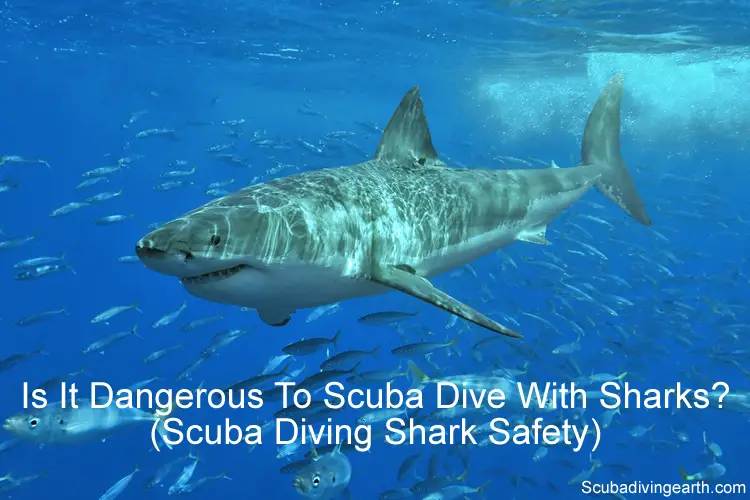
Is it dangerous to scuba dive with sharks? Or will I be eaten? Understanding scuba diving shark safety
Many divers ask whether it’s dangerous to scuba dive with sharks? I have dived with many species of sharks around the world without incident so far. In fact I personally love to dive with sharks and actively seek them out!
The sad thing about sharks and humans is that over 100 million sharks are killed by humans every year. That’s a staggering 11,000 sharks killed every hour. This makes me sad and mad!
So is It Dangerous To Scuba Dive With Sharks? It’s not dangerous to scuba dive with sharks, as attacks on divers are extremely rare. This is because sharks don’t consider divers as prey. Sharks are usually wary of humans and any attacks are mostly out of mistaken identity or due to provocation. Provocation includes spear fishing around sharks.
“I have scuba dived with many species of shark and have never been harmed nor attacked by any of them. The sharks I’ve dived with include hammerhead sharks, Caribbean Reef sharks, thresher sharks and very large whale sharks, and even at times when I was very close to these sharks I felt safe.”
If you would love to dive with great white sharks, one of the best ways to do this is to book yourself on a scuba diving liveaboard that visits Guadalupe Island in Mexico. You can check the latest and best deals on liveaboards using the following window (opens in a new window):
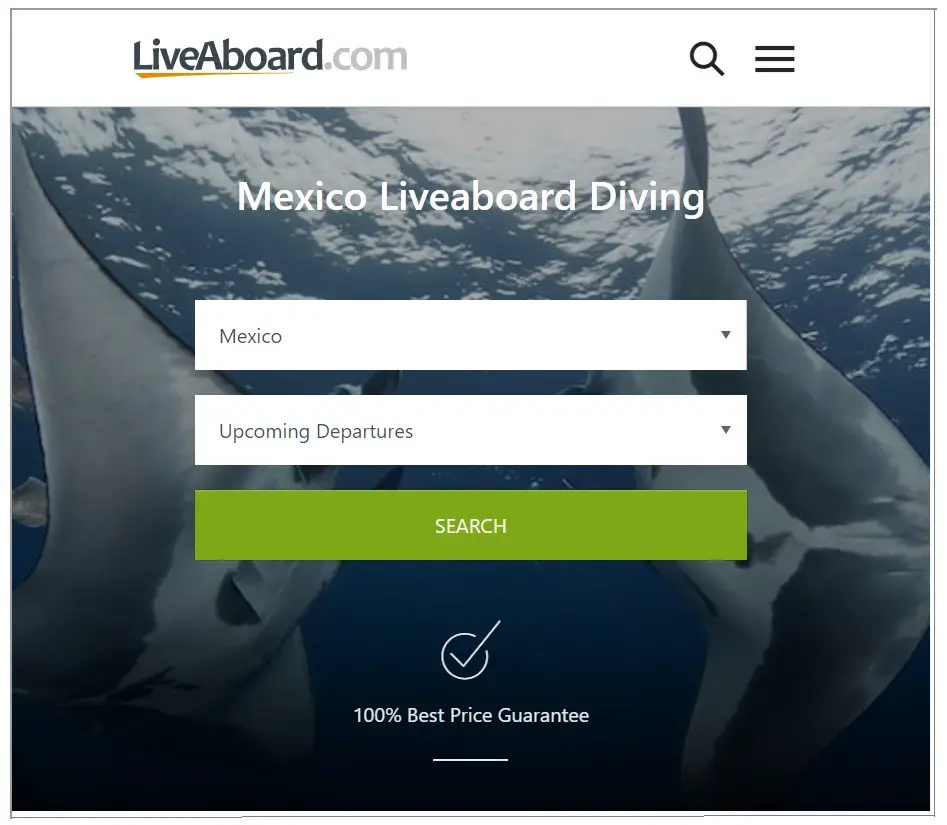
Or search our dive liveaboard pages here:
Whilst the answer is that it’s not dangerous to scuba dive with sharks“, but “what are the odds of a shark attack?”
According to the Florida Museum the annual risk of getting attacked AND killed by a shark is 1 in 3,748,067.
But in a lifetime, you’re more likely to die from:
- Fireworks (1 in 340,733);
- Lightning (1 in 79,746);
- Drowning (1 in 1,134);
- Car accident (1 in 84);
- Heart disease (1 in 5).
Which means you’re more likely to die of a heart attack whilst waiting to be attacked by a shark.
Also when considering the above statistics you need be careful driving to your shark dive. You’re more likely to be killed on the way in your car!
On average there are 70-100 shark attacks worldwide each year (Note this is all shark attacks on water users as a whole by the way, not attacks on scuba divers).
Only a very small percentage of this total is on scuba divers. Between 5 and 15 of the total 70-100 shark attacks result in death. Most of these deaths are other water users and not scuba divers.
Is it safe to scuba dive with sharks?

If you’re researching whether or not it’s safe to scuba dive with sharks, then I would like to leave you with the reassurance that it absolutely is safe to dive with sharks.
If you’re new to scuba diving and still yet to encounter a shark on a scuba dive, let me tell you the first time you do so; It’s amazing!
Scuba diving with sharks is an amazing experience and a privilege for divers to enjoy. Sharks are amazing predators and to see them in their natural environment is nothing short of spectacular!
- Had the pleasure of being within a few metres or feet of sharks on many dives.
- I’ve even come face-to-face with a Hammerhead on Elphinstone Reef in the Red Sea.
- Excitedly surrounded by Reef Sharks in the Bahamas.
- Plus swam within only a few metres or feet of the biggest Oceanic Whitetip ever!
At no point in any of the above dives was I in danger of being attacked!
My dive buddy on the dive with the Oceanic Whitetip nearly had a heart attack when they first saw the shark. My mask filed with water with laughing when I saw how much she jumped, when she turned to see it! This was on the Elphinstone Reef too.
The question “Is it dangerous to scuba dive with sharks” goes hand-in-hand with the question “is it dangerous to scuba dive“.
Scuba diving can be dangerous, but only if you don’t follow safe diving practices. The same is true of scuba diving with sharks. If you follow the rules of diving safely with sharks and don’t provoke them, you’ll enjoy the experience.
What are the warning signs of aggression in sharks
When a shark is acting aggressively, you’ll notice a difference in its behaviour.
In all the shark encounters I’ve had, the only time where I’ve seen any behaviour from a shark that indicated anything but normal relaxed behaviour, was on a dive in Antigua.
The dive concerned was on a wreck dive (Sorry the name of the wreck escapes me), and there were two sharks circling the wreck. One of the sharks began to behave in a more aggressive way, it’s pectoral fins were pointing down stiffly and it was swimming in a more erratic and frantic way.
We hadn’t done anything to annoy the shark, but for some reason our presence had annoyed it. However, it may not have been our arrival that caused this aggressive behaviour.
So I’m not too sure why this reef shark decided to behave in the way it did. We kept our distance and went about our dive calmly and without incident. After a few minutes, the shark’s behaviour calmed down and it eventually swam away.
From all the diving with sharks that I’ve done, even with this slightly unusual encounter with the shark in Antigua, I’ve never felt threatened at all.
How many scuba divers get attacked by sharks?
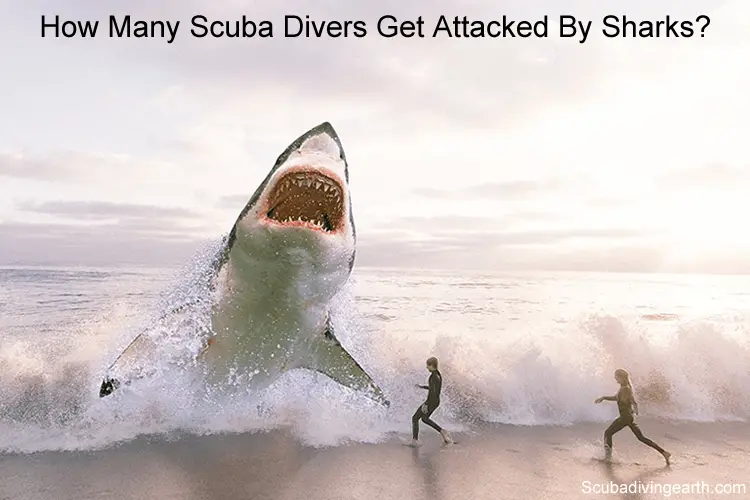
The truth about sharks is they are predators and they can be unpredictable.
The infamous scuba diver legend Jacques Cousteau is quoted as saying: “The only predictable thing about sharks is that they are unpredictable.”
Attacks on scuba divers have happened. They are also likely to happen again in the future. However, many more people die everyday in road traffic accidents each year.
But that doesn’t stop us from driving to work every day. So when asking about how many scuba divers get attacked by sharks each year, it’s about putting things into perspective.
There’s a much higher probability of being killed on the road in a car whilst driving to your dive with sharks that there is of being killed by one of the sharks on the dive itself.
How often do scuba divers get attacked by sharks?
Shark attacks on scuba divers are extremely rare. They are less frequent on scuba divers than attacks by sharks on other water users.
Water users include snorkelers, surfers, spear fishermen and bathers in the shallows. By the way there are billions of human hours spent in the water each year.
It’s been estimated that only 40 scuba diver deaths have EVER been recorded as a result of shark attacks.
The risk of water users as a whole being attacked by a shark is 1 in 3,748,067. But compared to drowning (1 in 1,134) and a car accident (1 in 84).
Comparably the risk is very low.
Reading this article about diving with sharks and shark safety, by Paul Courtnage (Thank you Paul), Paul estimates that there has probably only ever been around 40 scuba divers killer by sharks; ever!
Which when you look at the millions of dives done every year, the chances are extremely slim of you being attacked or killed by a shark whilst scuba diving.
As I said in the introduction to this article, you are more likely to be killed in a car accident on your way to the dive. Or more likely to die of a heart attack, whilst waiting for a shark to eat you!
Provoked vs unprovoked shark attacks on humans
When considering the shark attack statistics, there’s unprovoked shark attacks and provoked shark attacks.
An unprovoked shark attack is an incident that occurs between a human and a shark in it’s natural habitat, where there’s been no human provocation.
Whereas, a provoked shark attack usually occurs when a human initiates physical contact with a shark in its natural habitat. For example, a diver grabs a shark’s tail or a spear fishermen provoked interest from sharks due to spearing fish.
According to the International Shark Attack File (ISAF):
- There were 70 unprovoked shark attacks and 39 provoked attacks in 2016 of all water users.
- The average between 2014-2018 was 82 incidents annually on all water users.
- 2019 there were 64 unprovoked shark attacks worldwide on all water users. 41 of these were in the USA and 11 in Australia.
I couldn’t find up to date statistics for road traffic deaths, but in 2013 there were 1.25 million road traffic deaths globally.
In 2015 17.7 million died from Cardio Vascular Disease (CVD), which are split between coronary heart disease (7.4 million), stroke (6.7 million) and 3.6 million for other CVD related diseases.
Also, if you look at the research carried out by DAN and the 2010 DAN Diving Fatalities, shark attacks don’t appear on this list.
In the ISAF 2016 Worldwide Shark Attack Summary there were 154 incidents in total, of which 84 were unprovoked. 58% of these cases involved board sports, 32.1% on swimmers/waders and 3.7% on those using flotation gear.
Most notable, there was only one attack on a scuba diver in 2016.
Why do sharks not attack scuba divers?
The main reason why sharks don’t attack scuba divers is there’s less of a chance of mistaken identity. For example, a surfer can be mistaken from below as either a seal or a turtle. Snorkelers and bathers tend to splash in the shallows, which is what can attract sharks.
But on the whole sharks are wary of scuba divers. We are large ‘unknown’ creatures breathing bubbles. It’s unlikely we’ll be mistaken for any of a shark’s usual prey.
Why do sharks attack surfers and not scuba divers?
In a truly rare event, an unfortunate surfer gets attacked by not just one, but two sharks at the same time…and lives to tell the tale!
Surfers are the most likely people to be attacked by sharks. But why do sharks attack surfers and not scuba divers?
Surfers spend most of their time in the ‘surf zone.’ Whilst they are in this surf zone they are engaged in ‘provocative activities‘. These activities include the kicking of feet, splashing of hands and wipe-outs.
All of this activity are indicators to sharks of potential victims or ‘meals.’
Sharks are opportunists, as are most predators. If a predator can find an ‘easy-meal,’ i.e. injured prey, this makes predation much easier. Splashing for example, may indicate to a shark a flailing animal. To a shark a surfer splashing in the water can sound like a struggling fish…an easy meal.
Also, from below a surfer can look like a seal or a turtle to a shark. So the poor surfer is attacked not because he’s on the menu, but through mistaken identity.
Why do sharks not attack scuba divers underwater?
The difference between a surfer’s activity and that of a scuba diver is completely different. For one, scuba divers are underwater with the sharks in their environment.
Sharks don’t attack divers, because unlike surfers who splash arms and kick legs on the surface in the surf zone (Making them sound like struggling fish), scuba divers swim under the water without the same provocative activity.
Divers are not splashing or flailing around like a surfer. But instead scuba divers kick their feet with fins with a more gentle motion. Diver’s fin movement doesn’t sound like an injured fish.
Also, keep in mind that sharks are predators. Which means they can only hunt successfully if they are healthy and uninjured. For this reason, sharks tend to be cautious around divers. They don’t normally approach something that’s large and what they don’t understand.
Sharks usually stay away from scuba divers. This is because they are difficult to recognise as their usual prey. Sharks are not aware of how vulnerable we are when we’re in the water. All they see is a large creature creating huge amounts of bubbles that they don’t understand.
Sharks don’t reason with how they are much better suited to the underwater environment than we are. Which means that sharks are naturally wary of scuba divers.
How do sharks locate their usual prey?
Sharks are thought to home-in on blood and movement. They have the most amazing ability to sense electrical impulses using their electro-receptors (Ampullae of Lorenzini).
Sharks have been largely known to have the most amazing sense of smell. It’s estimated that they are able to detect blood at one part per million of water. If there’s blood in the water, this to them indicates an injured animal. Although, Biologist at Florida Atlantic University in Boca Raton Tricia Meredith has partly busted the myth of the shark’s sense of smell.
Meredith carried out experiments on sharks that were captured in the waters off the coast of Florida. Her conclusion in her study showed that sharks had no better sense of smell than any other fish.
However, the argument continues. As the sharks tested were only a certain group of coastal sharks. Jelle Atema, who studies shark olfaction at Boston University, says the myth is only mostly busted.
Atema questions whether the same sense of smell applies to sharks that live in the open oceans. She is also intent on doing more research on the subject.
Can sharks smell my period and should I not dive when I’m menstruating?
A question often asked by women about scuba diving with sharks is; “can sharks smell my period?” A valid question and especially based upon the belief about their keen sense of smell.
However, based upon new research by Tricia Meredith, the myth of their sense of smell is partly busted in any case.
Menstrual periods do not provoke shark attacks on women. This is a myth that simply refuses to die.
However, despite this and whether or not a shark’s sense of smell is a myth or not, there’s no evidence to suggest that a women menstruating will cause a shark feeding frenzy. It just doesn’t happen.
Menstrual fluid contains more than just blood. It also includes the lining of your uterus, cervical mucus and other normal secretions. Sharks have evolved to detect amino acids from the blood and guts of marine animals.
An article in ‘Popular Science,’ discusses women’s periods and the menstrual cycle. In that article, Marie Levine, founder and executive director of the Shark Research Institute, told Mother Jones back in 2012:
“I’ve been diving for decades and even got my period while underwater with a school of hammerheads, the sharks were not interested and I had to fin like crazy to get close to them.”
In the same article makes about whether menstrual blood provokes attacks sharks, Chris Lowe says “This is one of those misconceptions that refuses to die.”
With the number of women divers around the world, and the number of shark attacks on divers, this myth is truly busted and is simply not true.
Periods do not cause shark attacks!
What to do if you encounter a shark while scuba diving?
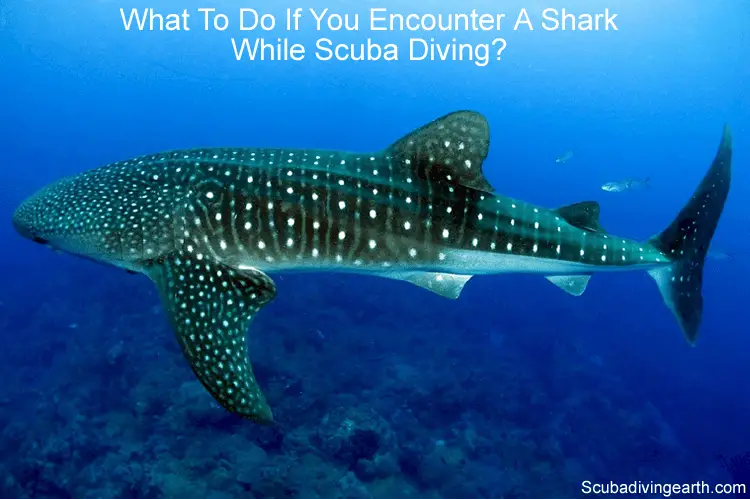
My first answer to “What do you do if your scuba diving and see a shark?” Is get excited and enjoy the encounter.
Seeing a shark is a privilege.
I have dived in many places around the world and encountered many difference shark species, from Hammerheads, to Thresher Sharks, to Oceanic Whitetips to an array of Reef sharks. Plus the inimitable shark of all, the one that most scuba divers see as the holy grail of sharks; the Whale Shark.
All encounters have been enjoyed. You should do the same.
How to avoid shark attacks while scuba diving
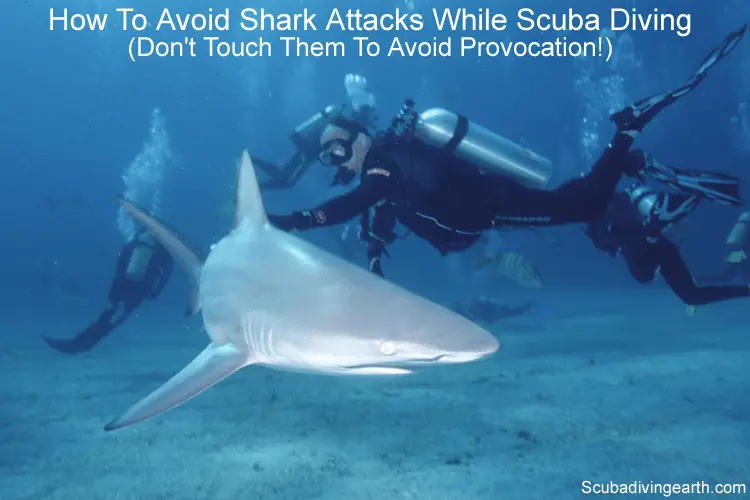
As already mentioned, some shark attacks are provoked and others are unprovoked.
To avoid provoking a shark be respectful and don’t touch them.
The unprovoked attacks are difficult to avoid or change, but rest assured these are extremely rare on scuba divers in any case.
With regards to provoked attacks, these can be avoided as follows:
- Give the sharks you encounter the respect they deserve.
- Don’t prod or try to touch the sharks you see. For example, it’s every easy to get close to Nurse Sharks that sleep under rocks or cliff over-hangs. This means you are able to get extremely close to them, so look, but don’t touch.
- Don’t spear fish in places where large sharks live.
- If a shark is behaving in aggressively, for example if it’s pectoral fins are held down stiffly and if it’s swimming in an aggressive manner, don’t swim towards a shark like this. Stay calm and if you can, swim away. But keep an eye on what is happening.
- Also, always remember to look behind you. It’s not only sharks that might be behind you that you may miss. There are other creatures you might miss spotting, by not looking in all directions.
What sharks are dangerous to divers?
The sharks that have been known to attack scuba divers are the Great White Shark. I know of an attack off the coast of California where a scuba diver was taken by a Great White Shark near to San Diego. I found this out when I was diving there off the beaches near to Del Mar.
The other place where I know there have been Great White Shark attacks is Perth in Western Australia. I lived in Perth for six months, so I know it well. In 2016 Doreen Collyer was attacked while diving off Mindarie in Perth by an 18 foot Great White Shark. It’s unusual to hear of a shark attack on a scuba diver though.
Perth and south of the city towards Albany is known for Great White sharks, as the waters are cold and the waters are near to the continental shelf.
Why a shark attacks humans
Mostly, attacks by Great White sharks are through curiosity. The problem when a Great White takes an exploratory bite, due to the size of their mouth and teeth, it causes serious injury. So even after the shark leaves after realising that the human it just ‘tested’ is not its usual prey, it’s too late and the victim bleeds-out.
However, despite the huge fear that people have of the Great White Shark, which is largely due to the Jaws films, they are still a relatively shy creature.
For example, when I was diving in South Africa and out on a boat off from Gansbaai, and in ‘Shark Alley‘ between Dyer Island and Geyser Rock, I was curious to learn how difficult it could be to lure Great White Sharks to the boat. I was also interested to learn how each step had to be carefully done to avoid scaring the White Sharks away.
For example, we eventually had a large Great White Shark circling the boat. At one point the shark came up to the side of the boat and showed its huge head and one of its eyes – she was around 4-5 metres (13-16 feet) in length. The skipper then put the cage carefully in the water, being careful not to scare her way.
The next stage was to climb into the cage. But for me, it was the fact that each stage was done so carefully and slowly to avoid scaring the Great White away. I imagined before I went that they’d be bolder than that and not afraid of the cage or of scuba divers in this way.
How many sharks are killed by humans compared to how many humans are killed by sharks?
I’d like to leave you with this thought. Compared to how many sharks are killed compared to humans and how many sharks kill humans, the statistics are hugely stacked against the sharks.
“We should be afraid of sharks half as much as sharks should be afraid of us.” Peter Benchley (Author of Jaws)
Every year humans kill 100 million sharks. That’s a staggering number and one I was shocked and saddened to learn. Sharks have been on the planet for millions of years. They have evolved to be one of the most fascinating and well evolved predators on Planet Earth.
So as scuba divers we shouldn’t fear sharks, but instead respect them in stead. Yes, there is a small risk you could get attacked by a shark, but if your follow the guidance in this article and understand the risks, you’d be very unlucky to be a victim of a shark attack.
What about scuba diving with Great White Sharks – is this dangerous?
Great white sharks are probably the only shark you need to be more careful with. You want to watch this video with Steve Backshall. You will note that these sharks are only there because they’ve been baited (i.e. they’ve been provoked).
As an aside, it was interesting to see Richard Bull in this video, who I interviewed for my blog. If you wan to read about Richard, please see this article: An Interview With Richard Bull (Professional Scuba Diver).
Steve Backshall’s first encounter outside the cage with Great whites. In the crystal clear seas, it’s possible to watch the body language of individual sharks before swimming out alongside them. Which doesn’t make it any less scary!
I hope you enjoyed this article about whether it’s dangerous to scuba dive with sharks
I’d love to hear from you. Tell us about your adventures of diving and snorkeling, in the comments below. Please also share your photos. Either from your underwater cameras or videos from your waterproof gopro’s!
If this article hasn’t answered all of your questions. If you have more questions either about snorkeling or scuba diving (or specifically about scuba diving shark safety), please comment below with your questions.
There will also be many more articles about scuba diving (and on snorkeling) for you to read and learn about this fabulous sport.
Have fun and be safe!

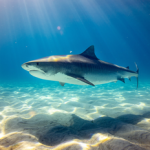
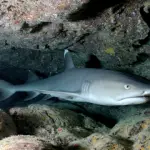
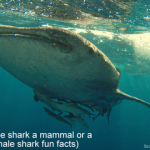
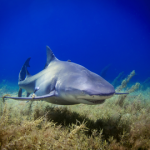
great post lots of good information here
Thank you and thank you for taking the time to comment . Have you scuba dived with sharks and what was your best experience?
Good post, as you say 100, million shark killed by humans every year, the ratio of dead human and shark is major, it is save to dive with shark ,mostly it is very few cases in which shark attacked human. this post is knowledgeable thank you so much for sharing.
Thank you for your comments and yes it really saddens me that so many sharks are killed each year only for their fins. The worst part is the ones that slice the fins off and throw the poor sharks back into the sea still alive so they die a slow death!